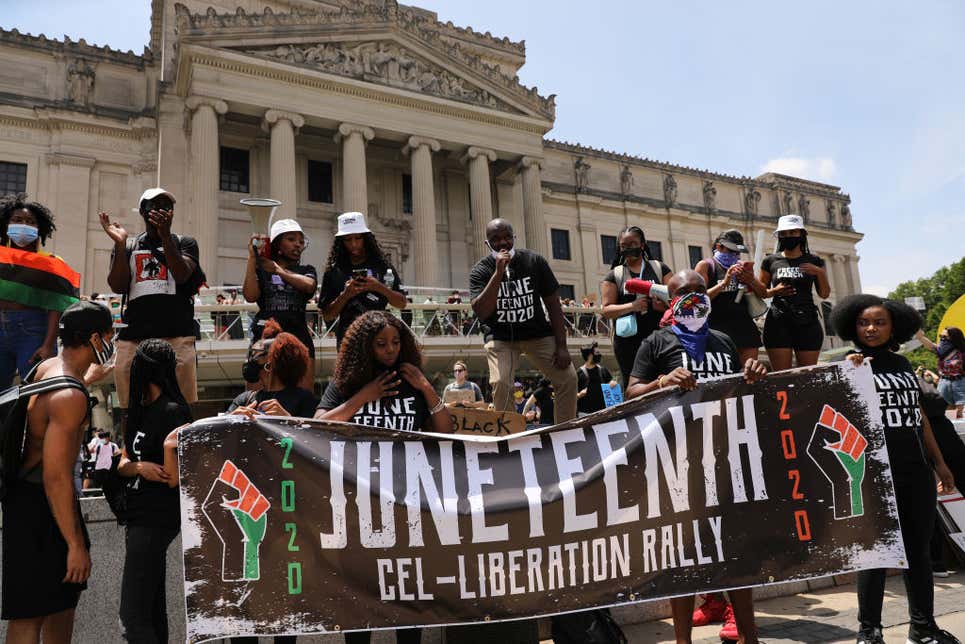 |
A Sense of Doubt blog post #2313 - Happy Juneteenth 2021!
Today, I am celebrating Juneteenth with articles from my favorite sites.
I am GRADING ROBOT because it's the end of the quarter.
But you don't need me to tell you about the importance of Juneteenth, do you?
HAPPY JUNETEENTH!!!
https://www.theroot.com/juneteenth-is-more-than-a-federal-holiday-we-need-repa-1847120935
Juneteenth Is More Than a Federal Holiday.
We Need Reparations Now
The speedy passage to make June 19 a holiday
shows that government can act quickly. They should keep that same energy for
the House reparations bill.
Jade Magnus Ogunnaike
Although it’s great to see Juneteenth
recognized as a federal holiday, it needs to be more than just a paid day off.
It is a day to recognize the manifestation of history’s destruction into our
present and act towards a more progressive and inclusive future. Another
three-day weekend does little to address the decades of political, economic,
and social disenfranchisement of Black people—justice cannot wait any
longer. We need reparations, and
we need them now.
If anything, this speedy legislative move
shows that elected officials are able to get things done fast, so why are they
stalling on legislation like the House Resolution 40, filibuster, voting rights
protections, or any other legislation that actually guarantees equity for Black
communities? Acknowledging our history is just the first step and we cannot
mistake this move as anything that will ensure the political power of our
communities. If the House were to vote to recognize the legacy of slavery as a
federal holiday, what’s the hold up on passing reparations legislation for
Black people?
It’s no secret that corporations have the
influence to enact policies that empower their Black workers. We’ve already
seen statements of solidarity and Black fists as promotional graphics from the
corporations that claim to stand with Black people. Yet, we’ve also seen how
these corporations refuse to provide livable wages or worker protections for their
Black employees.
Elected officials are no different. Powerful
decision-makers have become too comfortable in virtue signaling and
performative activism without any intention of creating tangible change for our
communities or prioritizing reparative justice. While attending the Tulsa
centennial, President Biden made no mention of reparations and even discouraged any real strides for
legislative action. Enacting real power for Black communities takes
more than a quick speech on a weekend work trip—it involves listening to the
demands of the community and representing them effectively.
This Juneteenth, we’re demanding that elected officials and
corporate leaders spare us the performative publicity stunts and get to work on
supporting reparative justice efforts by passing House Resolution 40.
Last month, the survivors of the Tulsa Race
Massacre received financial gifts of
$100,000 each from Justice for Greenwood Foundation and Color Of Change
fundraising and the donations have been celebrated as a major turnaround from
the usual discouragement in efforts for reparations. However, these financial
gifts are only a result of the immense pressure from organizations like Justice
for Greenwood and our national members—not from the insurance companies or
elected officials who denied any form of relief for the survivors in the 100
years since the attack.
We don’t need reparations only because of what
happened decades ago—we need them because of what is happening today. The
centennial commemoration in Tulsa reminds us that our nation’s history does not
remain in the past, but transcends to our present everyday lives. We cannot
wait for another 100 year commemoration to finally recognize that we need
reparations now. If elected leaders truly wanted to celebrate Juneteenth, they
wouldn’t just acknowledge the day and call it a job well done. They would move
beyond words to actions and pass legislation to rebuild a society to ensure
justice, freedom, safety and prosperity for our communities.
House Resolution 40, or
the Commission to Study and Develop Reparation Proposals for African-Americans
Act, is a necessary and clear step to remedy structural racism and white
supremacy in the United States. This federal bill would provide the proper
procedure to make reparative justice real for Black people—providing businesses
PPP loans at higher rates and restoring the businesses lost through white
supremacist violence, implementing public transportation for geographically
segregated Black communities, and the opportunity to reinvest into resources
locally so that we can ensure our communities thrive.
Members of Congress’ hesitation around
supporting the bill, among others related to real racial justice, are excuses
to “save their seat’’ in the 2022 midterm election. Yet, if they are dedicated
enough to recognize the legacy of slavery on a national level, there should be
no controversy in acting to relieve the impact of that legacy through passing
H.R. 40.
Efforts for reparations are already happening
today—aside from economic gifts for the Tulsa survivors that were a result of
campaigning from Black organizations, stimulus relief for Black farmers who
lost the majority of their land from years of systemic bias, and demands
for banks to rectify their acts in
racist loan discrimination are active results of the work of organizations
fighting for Black community restoration. We have the collective power to
demand the justice Black communities are owed and begin to reconcile the
lasting effects of slavery.
Recognizing pain is just the first step. What
comes next is reimagining and rebuilding a society in which Black lives truly
matter. It means moving beyond words to actions. Reparations are not just about
addressing the past, but about ensuring that Black communities receive the
justice, safety, and stability they are owed presently and in the years to
come. This Juneteenth, as we celebrate freedom and resilience, we’re calling
for Black prosperity to be prioritized. We have the power to alter the future
cycle of history repeating itself by demanding to prioritize reparations legislation that
will guarantee Black communities’ political power, not just a day off of work.
We must pass sweeping, national reform to even begin to address this glaring
oversight, or it will be another centennial commemoration when we are asking
the same question: when will justice be real?
Jade Magnus Ogunnaike is Senior Campaign Director of Color Of Change, the largest online racial justice organization in the country. Color Of Change helps people respond effectively to injustice in the world around us. As a national online force driven by over 7 million members, we move decision-makers in corporations and government to create a more human and less hostile world for Black people in America. Visit www.colorofchange.org.
Critical Race Theory Panic Is Everywhere—Just in Time for Juneteenth
And that’s no coincidence.
The latest “woke” boogeyman riling up conservatives is critical race theory, a scholarly framework that seeks to understand the role race and racism have played in all aspects of society. Of course, ask a Fox News host, and he’ll tell you with a straight face that CRT is a Marxist ideology that teaches white children that they’re inherently inferior—and if that’s not enough, they should feel bad about their skin color. According to extensive research by Media Matters for America, Fox News has mentioned critical race theory more than 1,300 times in the last three-and-a-half months alone.
Fox is obviously not alone in hammering the point, and the fake outrage about critical race theory is hitting a fever pitch at a crucial moment: the month when Juneteenth, a commemoration of the end of slavery, is celebrated. This celebration is a relatively new phenomenon. In the past, the day has hardly been acknowledged, but it has gained more recognition recently. And after last year’s racial justice protests, companies and schools rushed to acknowledge the day with time off, celebrations, and learning opportunities. But that acknowledgment has its limits.
After a year of demonstrations and a devastating pandemic that still continues to disproportionately kill people of color, Republicans are fighting yet another battle that doesn’t really exist. Okay, perhaps a few teachers are telling students that they’re inherently bad for being white, but the larger point is crucial: Collectively, we still struggle to fully understand America’s real history, including the persistent legacy of slavery. So how can we celebrate Juneteenth when we can’t even talk about racism
First of all, let’s understand what this holiday commemorates. On June 19, 1865, Major General Gordon Granger went to Galveston, Texas, with other federal soldiers and walked the streets reading General Order No. 3, a document declaring the slaves were free. The following year, on the anniversary of his walk, the freedman celebrated.
It’s important to know that the announcement in Texas came two years after Abraham Lincoln’s Emancipation Proclamation of January 1, 1863, and that the official end of slavery didn’t happen until the ratification of the 13th Amendment in December 1865. Almost immediately after slavery was abolished, the former Confederate states attempted to reinstall a white supremacist regime; they waged a violent campaign throughout the South, crushed the short-lived Reconstruction era, and ushered in Jim Crow, the effects of which we’re still living with today. Juneteenth may be considered a cause for celebration, but it’s also the day that marks a new chapter of post-slavery America: the beginning of the long, difficult march toward racial equality that continues today.
There’s no small irony in the fact that in Texas this week, the state where the holiday originated, Republican Gov. Greg Abbott signed a law limiting how educators can talk about current events and America’s history of racism. In effect, the law seeks to ban critical race theory. Notably, the law prohibits schools from ever using as a teaching tool the New York Times’ 1619 Project. The prize-winning endeavor theorizes that the real founding of America took place not in 1776, but 1619, the year when the first enslaved Africans first arrived in Virginia.
Texas is not alone in its attempts to censor educators who attempt to teach about America’s racist history. As I’ve written previously, these laws have gone into effect in several states and have had real-life consequences. Consider Melissa Smith, an adjunct professor at Oklahoma City Community College who has been forbidden from teaching her Race & Ethnicity course this summer, because state lawmakers banned instruction in every educational venue on critical race theory.
Government Recognition of Juneteenth Is Not Enough
What, to the Black American, is your federal holiday?
On Tuesday, the United States Senate voted unanimously in favor of a bill that would make Juneteenth a federal holiday. On Wednesday, the House of Representatives followed suit; the bill now goes to President Biden, who will sign it into law on Thursday afternoon. Juneteenth commemorates June 19, 1865, the day that bondspeople in Galveston, Texas were the last enslaved Americans in the nation to learn that they were free. (They had actually been freed two years prior, by the Emancipation Proclamation.) Congress’ choice to recognize Juneteenth’s historical and cultural significance is certainly noteworthy. Yet, in the face of ongoing racial oppression, what, to the Black American, is your federal holiday?
The track record for federal holidays with roots in Black history isn’t good. Such holidays have repeatedly been whitewashed and divorced from their original meaning. As historian David Blight has argued, some of the earliest iterations of the late-spring holiday now known as Memorial Day were borne out of ceremonies to honor Black soldiers who fought in the Civil War. In 1865, Charleston, South Carolina was home to a Confederate camp that imprisoned Union soldiers, many of whom were Black and buried in a mass grave. On May 1, 1865, after Confederate soldiers had surrendered, Charleston’s Black community reburied the dead in a cemetery and decorated their graves. But few people are familiar with Memorial Day’s historical origins among Black soldiers and Black mourners; yearly, it seems, articles appear online to tell us about the holiday’s “overlooked Black history.”
Martin Luther King, Jr. Day is subject to related forms of whitewashing. The holiday was controversial when it was first proposed, but since then, things have changed. Rather than grappling with the complexity of Dr. King’s intellectual thought, particularly his increasingly leftist critiques of poverty and of the complicity of white moderates, MLK Day celebrations frequently de-racialize and de-radicalize his legacy. Rather than interrogating the conditions that motivated Dr. King to claim that “a riot is the language of the unheard,” Americans are far more likely to embrace an inaccurate, colorblind interpretation of his work. For instance, his commitment to peaceful protests is regularly weaponized to oppose calls for racial justice, such as the #BlackLivesMatter movement. Dr. King’s daughter, Bernice King, recently expressed her displeasure at this rhetorical strategy, writing on Twitter: “I wonder how you would feel if people erroneously and arrogantly used your father to justify them being against what he was assassinated for being about.”
Given the ways that Dr. King’s lifework and MLK Day have been distorted, it seems valid to fear that making Juneteenth a federal holiday has the potential to diminish its significance, instead of generating further inquiry into the history of American slavery and emancipation. The context of the passage of this legislation gives advocates for honest discussion of Black history little reason to hope. The vote to make Juneteenth a federal holiday occurred alongside state-level attempts to ban discussions of so-called “critical race theory” in classrooms. At last count, 21 states have introduced bills to ban critical race theory and related topics from being taught in K-12 schools and college classrooms. Meanwhile, as Republican state legislatures pursue voter suppression laws, the 2021 For the People Act—an attempt to protect voting rights for all citizens by establishing automatic voter registration for federal elections, banning partisan gerrymandering, and more—faces an uncertain road to passage in the Senate.
Some politicians, particularly right-wing and centrist US senators, have eagerly obstructed attempts to enact anti-racist legislation like the For the People Act. Most of these same lawmakers have now voted to make Juneteenth a federal holiday. The hypocrisy would be comical were it not so dangerous: in the midst of nationwide, Republican-led efforts to eliminate conversations about the significance of race and racism in the United States, the United States Congress has, with the cooperation of most of its GOP members, endorsed legislation to commemorate the end of racial slavery. It seems clear that the goal in making Juneteenth a federal holiday is not to grapple with this country’s history of racism; it is to stifle critiques of continued racial discrimination.
Passing a bill that would make Juneteenth a federal holiday, in this historical context, is, as Douglass stated of 4th of July celebrations almost 170 years ago, “mere bombast, fraud, deception, impiety, and hypocrisy—a thin veil to cover up crimes which would disgrace a nation of savages.” Voting in favor of this bill allows politicians to deny allegations of racism, even as they actively oppose measures that seek to redress racial harm, such as reparations, police abolition, and more. We cannot accept empty symbolism in exchange for our rights. Any attempt to commemorate the end of slavery must be accompanied by tangible changes that seek to undo its effects.
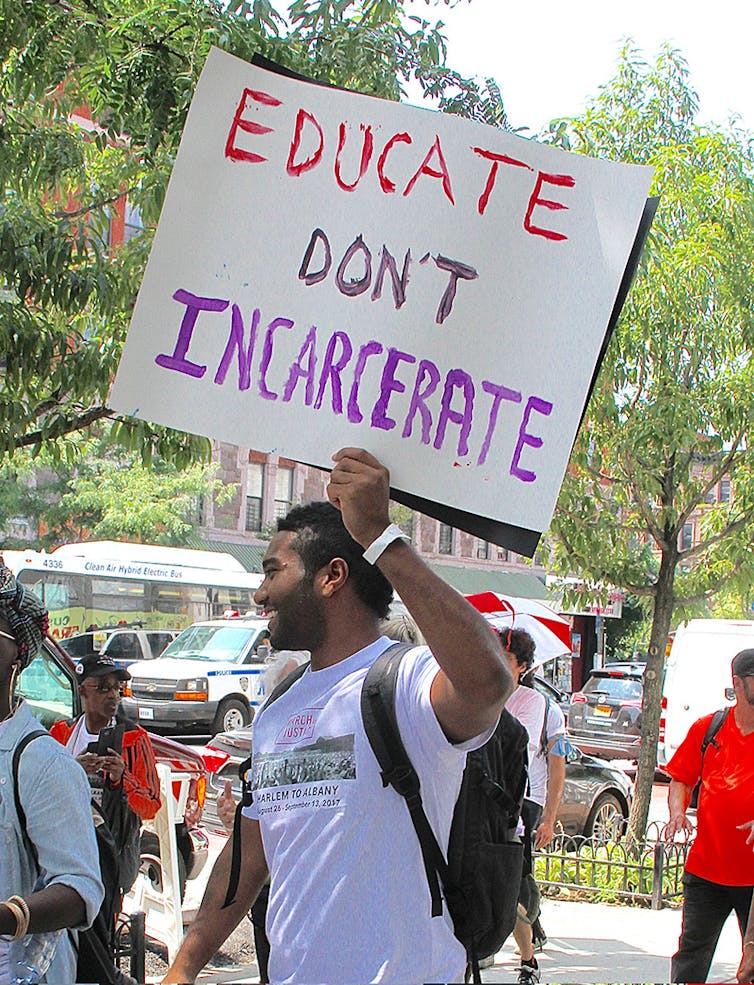 |
| Protesters march through Harlem in the March for Justice. Rainmaker Photo/MediaPunch/IPX |
Juneteenth: Freedom’s promise is still denied to thousands of blacks unable to make bail
June 19 marks Juneteenth, a celebration of the de facto end of slavery in the United States.
For hundreds of thousands of African-Americans stuck in pretrial detention – accused but not convicted of a crime, and unable to leave because of bail – that promise remains unfulfilled. And coming immediately after Father’s Day, it’s also a reminder of the loss associated with the forced separation of families.
On a very personal level, I know how this separation feels. Every Father’s Day since 2011, I’ve been reminded of the unexpected death of my dad at the age of 48. But also on a professional level, as a criminologist who has been researching mass incarceration for the past decade, I understand the disproportionate impact it’s had on African-Americans, destabilizing black families in the process.
Blacks behind bars
Juneteenth is a celebration of African-Americans’ triumph over slavery and access to freedom in the U.S., which occurred in Galveston, Texas, in June of 1865, over two and a half years after President Lincoln’s Emancipation Proclamation.
While Juneteenth is a momentous day in U.S. history, it is important to appreciate that the civil rights and liberties promised to African-Americans have yet to be fully realized. As legal scholar Michelle Alexander forcefully explains, this is a consequence of Jim Crow laws and the proliferation of incarceration that began in the 1970s, including the increase of people placed in pretrial detention and other criminal justice policies.
There are 2.3 million people currently incarcerated in American prisons and jails – including those not convicted of any crime. Black people comprise 40 percent of them, even though they represent just 13 percent of the U.S. population.
Not yet guilty but not free
More troubling is the number of incarcerated individuals currently held in jail for crimes of which they have not yet been convicted.
The Prison Policy Initiative, a nonpartisan think tank that focuses on mass incarceration, has reported that over a half million citizens are languishing in pretrial detention. And like most criminal justice outcomes, the burden of this disproportionately falls on minorities, especially black men and women.
In local jails alone, over 300,000 people are awaiting trial for property, drug or public order crimes. And again, these disproportionately black defendants are confined and separated from their families, friends and jobs simply because they lack the means to post cash bail – the only reason they can’t get out.
Toll on families
It should be no surprise, then, that 1 in 9 black children now has a parent behind bars, compared with the national rate of 1 in 28.
And many of these children are at an increased likelihood of experiencing physical and mental health issues, academic struggles and a range of other behavioral problems. Children of incarcerated mothers are also at heightened odds of ending up in foster care and being exposed to other traumas.
Being the partner of an incarcerated individual is another often stressful experience that also falls disproportionately on black citizens, particularly women.
Some good news
The good news is that such injustices are receiving growing attention nationwide.
Just City, a nonprofit organization working to reduce the harms of the criminal justice system, has campaigned to raise funds and promote awareness of its Memphis Community Bail Fund project for Father’s Day – in part because nearly half a million of the black men behind bars are dads.
The aim of the project is to provide both financial and legal support for defendants lacking resources to independently secure their pretrial release, with the goal of the campaign being the release of jailed fathers so that they could be with their kids for the holiday.
Bail funds similar to Just City’s have proliferated throughout the U.S.
On one hand, the multiplication of these organizations is encouraging and reason for optimism. On the other, their growth is another reminder that many of the freedoms celebrated on Juneteenth remain unrealized.
A long road continues
In cities like Detroit, where 1 in 7 adult males is under some form of correctional control in some communities, it is a monumental task to make sense of the short- and long-term impacts of incarceration for black families.
Children suffer. Parents struggle. Relationships deteriorate. And as a result, so too do so many African-American communities. Lost wages matter to families, but they also matter to communities. The lower tax base that results makes it more difficult for struggling public institutions, like schools, to progress. And with such a large share of individuals removed from some communities due to incarceration, and branded as felons upon their release, these communities lose potential voters and the political capital they carry. They are too often disenfranchised and stripped of their full power and potential.
Juneteenth celebrates the freedom of black Americans and the long, hard road they were forced to traverse to gain that freedom. But as criminologists like me have maintained time and again, the U.S. criminal justice system remains biased, albeit implicitly, against them.
How Black writers and journalists have wielded punctuation in their activism
Using punctuation and capitalization as a form of protest doesn’t exactly scream radicalism.
But in debates over racial justice, punctuation can carry a lot of weight.
During the Black Lives Matter protests of 2020, mainstream news organizations grappled with whether to capitalize the first letter of “black” when referring to Black people. Of course, writing “Black” was already common practice in activist circles. Eventually The Associated Press, The New York Times, USA Today and many other outlets declared that they, too, would capitalize that first letter.
It turns out the push to capitalize “black” is only the most recent way Black writers and activists have pushed back against entrenched power through ostensibly bland elements of writing.
As I discuss in my recent book, “Jim Crow Networks: African American Periodical Cultures,” Black activism in the media can take a variety of forms – some more subtle than others.
Seemingly unimportant elements of writing have long been adapted as tools of Black activism. Much like the recent drive to capitalize “black,” activists have deployed punctuation to question the legitimacy of confessions, criticize justifications made for lynchings and highlight the undervaluing of Black expertise and knowledge.
The power of punctuation
Punctuation was developed in the century B.C. to visually separate sentences and improve comprehension. But punctuation can do more than clarify. It can extend, contradict and play with meaning.
Think of the difference between ending a sentence with an exclamation point and with an ellipsis, or the way emoticons made of repurposed punctuation can be used to denote sarcasm or add playfulness and emotion.
This makes it a useful tool for activists who seek to upend dominant narratives.
Quotation marks convey suspicion
A push to capitalize has actually happened before.
In the 1920s, influential Black intellectual W.E.B. Du Bois wrote to The New York Times and Encyclopedia Britannica to argue that the word “negro” ought to have its first letter capitalized.
A decade later, to counter racism in the white press, the Black press used quotation marks when reporting on the case of a young man named Robert Nixon, who was convicted of murder.
In 1938, the white-owned Chicago Tribune notoriously described Nixon – who would serve as the basis for protagonist Bigger Thomas in Richard Wright’s 1940 novel “Native Son” – as an “animal” whose “physical characteristics suggest an earlier link in the species.”
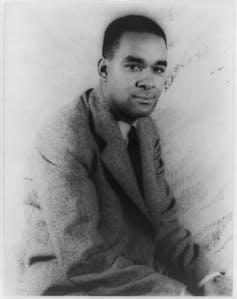
However, the city’s influential Black newspaper, the Chicago Defender, covered the case differently, reporting Nixon’s claim that his confession was the result of police coercion. In a 1938 article, the Defender included a subheading that declared, “Nixon Also Refutes ‘Confession’.”
These simple quotation marks signaled doubt over the legitimacy of this confession, while teaching newspaper readers to be suspicious of so-called legal facts.
As sociologist Mary Pattillo notes in her book “Black on the Block,” the Defender’s strategic use of quotation marks called into question official accounts of Nixon as a murderer. In doing so, the paper highlighted the unfair treatment of Black people by the media, police and court system.
The code of the question mark
Similarly, Black activists used question marks to criticize mainstream accounts of events during the Jim Crow era.
In her 1892 pamphlet “Southern Horrors: Lynch Law in All Its Phases,” anti-lynching activist Ida B. Wells used question marks in parentheses on four occasions to interrogate descriptions of crimes supposedly committed by Black Americans.
For example, she wrote, “So great is Southern hate and prejudice, they legally(?) hung poor little thirteen year old Mildrey Brown at Columbia, S. C., Oct. 7th, on the circumstantial evidence that she poisoned a white infant.”
She also quoted from one of her earlier newspaper editorials in which she discussed the lynchings of eight Black men by saying that, in each case, “citizens broke(?) into the penitentiary and got their man.” The question mark casts doubt on this “break-in” and suggests that the perpetrators were, in fact, aided and abetted by law enforcement in murdering these men.
These simple question marks subtly undermined a legal system that sought to cast the murders of a young girl and eight men as just responses. Wells indicted not only the legal system but also the white press, which was often an accomplice to racial violence.
[Over 106,000 readers rely on The Conversation’s newsletter to understand the world. Sign up today.]
Afrofuturist questions
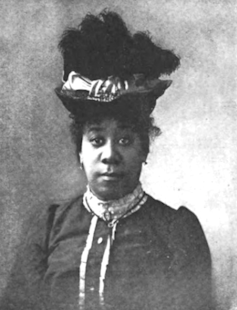
The writer, editor and activist Pauline E. Hopkins similarly used question marks within parentheses in her early Afrofuturist novel “Of One Blood.”
The novel – which contains depictions of a leopard attack, a lost African city and a ghost – was serialized in the pages of the Colored American Magazine from 1902 to 1903. At one point, the protagonist, a Black doctor, brings a patient back to life. Yet the responses to this miracle display ambivalence:
“The scientific journals of the next month contained wonderful and wondering (?) accounts of the now celebrated case, – re-animation after seeming death.”
Much as Wells used the question mark to dismiss the official accounts of lynchings, Hopkins deploys it to undermine the scientific establishment and cast doubt on the journals for their stunned and disbelieving responses to the medical marvel.
For Hopkins, the question mark worked to demand respect for Black expertise and knowledge.
Punctuation’s possibilities
Punctuation activism can be an important companion to on-the-ground activism. It reveals language’s capacity to transform the world. At the same time, it exposes language’s often hidden role in maintaining structures of power.
Certainly, punctuation – like language overall – is typically used in less radical ways. But these examples of early 20th century Black writers, activists and journalists point to punctuation’s possibilities in questioning entrenched power structures and laying claim to alternative futures.
Songs to Celebrate Juneteenth
“One of the chief values of living with music lies in its power to give us an orientation in time,” wrote Ralph Ellison.
In Ralph Ellison’s famous unfinished novel Juneteenth, the Rev. Alonzo Hickman, a Southern Black church leader, has to explain to a dying white senator that the eponymous holiday is still celebrated: “We haven’t forgotten what it means,” he says. “Even if sometimes folks try to make us believe it never happened or that it was a mistake it ever did…”
Ellison’s novel uses the holiday to ask questions about what freedom means. And it swirls around how the forgetting of history, of the past, gets us to that place. Juneteenth itself is a potent example of this. States, and businesses, are increasingly recognizing it is a holiday celebrating the end of slavery. But it honors the date—June 19, 1865—when Union Gen. Gordon Granger read federal orders in Galveston, Texas, announcing the freedom of enslaved Americans in Texas, even though President Abraham Lincoln had signed the final version of the Emancipation Proclamation on January 1, 1863. The point is that the proclamation did too little to change the lives of many Black people enslaved in the United States. This has an unfortunate rhyme with the way the holiday has been untaught and unheralded by white institutions.
Ellison was often interested in the history of forgetting. How does the United States hide itself from the past? And what does that mean for Black Americans whose past has been hidden? In one essay, he finds particular power in art that can combat American myths: music.
“Perhaps in the swift change of American society in which meanings of one’s origin are so quickly lost, one of the chief values of living with music lies in its power to give us an orientation in time,” he writes.
Here’s a list in that spirit. If you’re looking for Juneteenth-specific music, others have collected music about the holiday and I highly recommend collections from the Library of Congress on the holiday, including interviews conducted by Zora Neale Hurston. This is a shortlist of music, instead, that orients us in time. Much of it is on Bandcamp, which is celebrating the holiday by donating shares of purchases to the NAACP Legal Defense Fund.
Sonny Sharrock, Ask the Ages
The last album from legendary jazz guitarist Sharrock before his death, in 1994, Ask the Ages is not background music or casual listening—it is foregrounded and loud. It asks you to engage. In fact, it demands it. As Marcus J. Moore notes in the New York Times, Sharrock was part of a broader movement of black liberation jazz. The experimental nature here is a probing of what is possible. Sharrock is a bit more obscure than the names from the genre you’ve likely heard: Ornette Coleman, Pharoah Sanders, Alice Coltrane. But as one reviewer noted: With his guitar, he could “hold lightning in his bare hands.” He sought to traverse out to where free jazz went with horns and saxophones, notes exploding and overflowing. Of course, it helps on this record to have support from Sanders on saxophone and Elvin Jones on drums. I particularly like the track “Once Upon a Time.” But the record is best enjoyed in totality. —JR
Brother Ah
Brother Ah communicated with the world, and I don’t just mean that in the spiritual sense. I once interviewed the renowned jazz musician—who had played with all the greats, from Sun Ra to Thelonious Monk and John Coltrane—and he told me a story about how he once played flute for a blue crane, at the National Zoo, that was struggling to lay its eggs. He told me how he had studied the musical language of birds and was able to imitate their language to get the crane to lay eggs. You can hear how Brother Ah—whose given name was Robert Northern III—communicated with nature on his six solo albums, originally released in the ’70s and ’80s but given new life when reissued by the New York label Manufactured Recordings a few years back. Guided by Ah’s philosophy of “sound awareness” (the practice of understanding the world by listening for the music in nature) these albums are a deeply spiritual meditation. Brother Ah died on June 1 at the age of 86. But I believe that you can still hear his music in the sounds that surround you. You just have to listen. —MC
+++++++++++++++++++++++++++++++++++++++++++++++++++++++++++++++++++++++
+++++++++++++++++++++++++++++++++++++++++++++++++++++++++++++++++++++++
+++++++++++++++++++++++++++++++++++++++++++++++++++++++++++++++++++++++
- Bloggery committed by chris tower - 2106.18 - 10:10
- Days ago = 2177 days ago
- New note - On 1807.06, I ceased daily transmission of my Hey Mom feature after three years of daily conversations. I plan to continue Hey Mom posts at least twice per week but will continue to post the days since ("Days Ago") count on my blog each day. The blog entry numbering in the title has changed to reflect total Sense of Doubt posts since I began the blog on 0705.04, which include Hey Mom posts, Daily Bowie posts, and Sense of Doubt posts. Hey Mom posts will still be numbered sequentially. New Hey Mom posts will use the same format as all the other Hey Mom posts; all other posts will feature this format seen here.
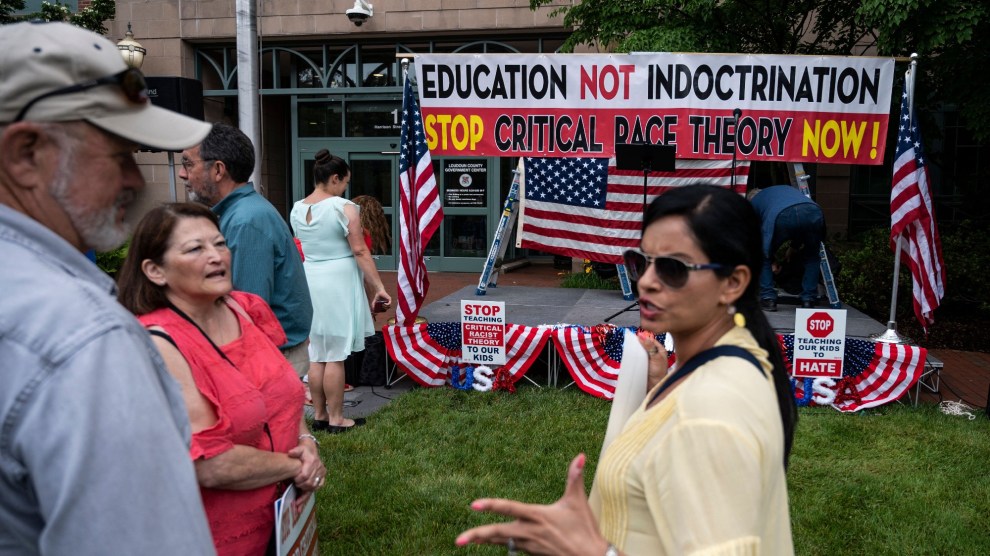

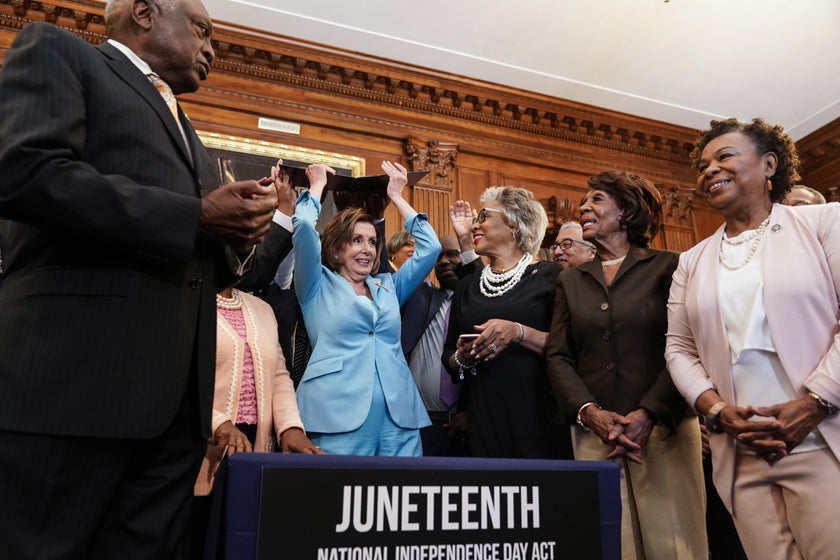

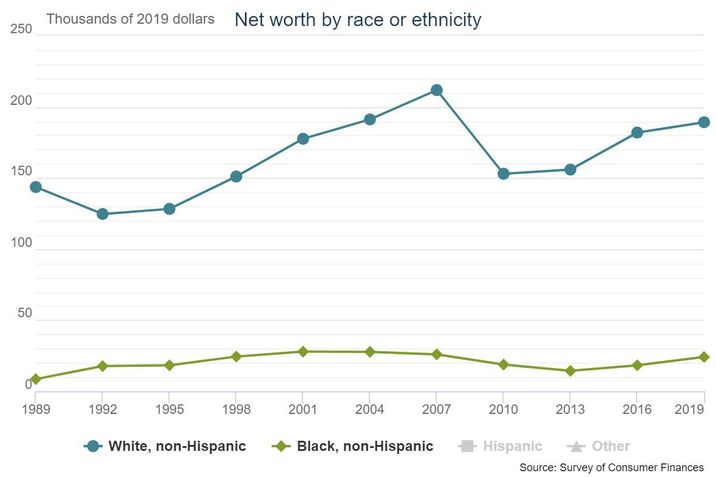

No comments:
Post a Comment